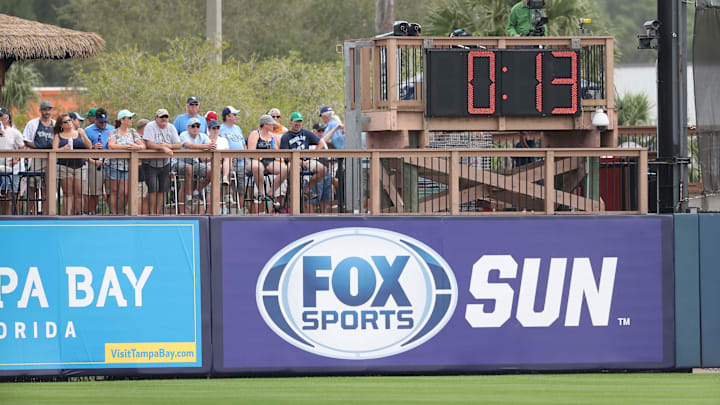KC Royals fans were well aware that the MLB's latest set of rule changes would require some adjusting. But, the pitch clock addition alone had big positive changes when the Royals faced off Friday against the Texas Rangers.
The Royals and Rangers did not have any players violate the pitch clock rules, but the increased pace of play was evident. Kansas City Royals broadcaster Joel Goldberg was at Surprise Stadium for the game, and credited a quick opening frame to the new pitch clock.
Welcome to MLB with a pitch clock. Daniel Lynch retiring the Rangers in order in less than 3 minutes pic.twitter.com/sajJjaFCAl
— Joel Goldberg (@goldbergkc) February 24, 2023
The pitch clock is here and KC Royals fans are torn about the MLB's newest change.
On top of a quick first inning from Lynch, the entire game lasted two hours and 33 minutes. That is 30 minutes less than the average game in the 2022 season. The second spring training game of the day, between the San Diego Padres and Seattle Mariners, was even quicker at two hours and 29 minutes.
Fans watching the Padres-Mariners game noticed how the pitch clock accelerated each plate appearance. It does not sound like a huge change, and it remains to be seen if all MLB games this season will be less than three hours. But, shorter games are a great thing for weekday baseball.
Personally, one of my biggest hurdles about attending baseball games on workdays is that it takes so much time. That 30-minute difference cancels out the time spent driving to and from the game, or it is 30 minutes of extra sleep after the game. The pitch clock makes attending weekday games more palatable, at least for full-time workers at least.
The rule changes will take some time for fans to learn by heart. While there are no runners on base, pitchers have 15 seconds between pitches; with runners on base, they have 20 seconds. By the time the clock hits eight seconds, batters must be lined up in the box and prepared. If the pitcher violates the rules, a ball is automatically awarded, and if the batter violates the rules, a strike is awarded.
The human element is still affecting pitch clocks, though. Each pitch clock is operated by a specified operator employed by MLB. These field timing coordinators will communicate with umpires, who have to enforce the rules themselves. There is some flexibility in how strict the rules are enforced, similar to how umpires have their own flavor of strike zone. MLB commissioner Rob Manfred made it clear though, that the rules will be enforced from day one.
""We reached the conclusion that if you have a grace period, you effectively have two periods of adjustment. Our experience [experimenting with the rules] in the Minor Leagues suggested we're just better off putting in the rule changes and moving through that adjustment period as fast as we can.""MLB commissioner Rob Manfred
Manfred wants to jump right in, and MLB players still have a month to get used to this new pace. The Royals will certainly see their fair share of growing pains, either now or after Opening Day. But, the initial results point towards a quicker product that will entice fans, both to the stadium and to their televisions.
